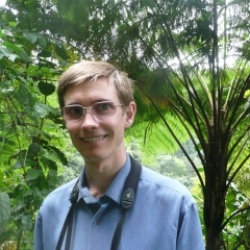
Dr Charles Pigott
Senior Lecturer
Spanish
Area of Expertise
Indigenous languages and literatures of Mexico, Peru and Bolivia
Cultural memory and biocultural heritage in indigenous cultures of Mexico, Peru and Bolivia
Indigenous philosophies of Latin America
Languages: Spanish; French; German; Portuguese; Yucatec Maya; Nahuatl; Central Quechua; Southern Quechua; some Catalan and Italian
Prize And Awards
- Member of UK Young Academy
- Recipient
- 2023
- Honorary Mention: MLA Prize for Studies in Native American Literatures, Cultures, and Languages
- Recipient
- 2022
Qualifications
Fellow of Higher Education Academy
Publications
- Maize landscapes in indigenous literatures : towards alternative cartographic imaginaries
- Pigott Charles M
- Latin American Research Review Vol 60, pp. 1-18 (2025)
- https://doi.org/10.1017/lar.2024.29
- Retrospective prophecy in contemporary Maya literature : Chim Bacab's Flower of Memory
- Pigott Charles M
- Anticipatory Environmental (Hi)Stories Narratives of Coming Nature(s) from Antiquity to the Anthropocene (2023) (2023)
- Indigenous poiesis : the semiotics of circulation in Villegas' Maya Poetry
- Pigott Charles Maurice
- The Routledge Companion to Ecopoetics (2023) (2023)
- https://doi.org/10.4324/9781003187028-9
- Landscapes of heterogeneity in mid-twentieth century Quechua literature
- Pigott Charles M
- Latin American Literature in Transition 1930–1980 (2022) (2022)
- https://doi.org/10.1017/9781009177771.011
- Aj-ts'íib or el letrado? Authorial identity in Gómez Navarrete's Bilingual Maya poetry
- Pigott Charles M
- Bulletin of Hispanic Studies Vol 98, pp. 415-432 (2021)
- https://doi.org/10.3828/bhs.2021.24
- Cosmic narratology and human exceptionalism in Maya poetry : Villegas’ Yáax K’áak’ [Primordial Fire]
- Pigott Charles Maurice
- Green Letters Vol 24, pp. 169-184 (2020)
- https://doi.org/10.1080/14688417.2020.1771609
Teaching
I am the class coordinator for the Honours classes "Shaping Spain: Ideas, Belief and Identity" (R4449), "Political and Social Crisis in Contemporary Hispanic Cinema" (R4402), and the second-year course "Independence and Isolation in Spain and Latin America" (R4200). I have also introduced a new undergraduate course, "Latin America through Indigenous Eyes".
I am delighted to accept PhD students in any of my areas of expertise.
Research Interests
Indigenous Studies (particularly in Mexico, Peru and Bolivia)
Cultural memory (especially biocultural heritage)
Environmental Humanities (particularly ecocriticism)
Intercultural Philosophy
Interface between Literary Studies, Linguistics and Anthropology
Professional Activities
- Visiones ecológicas en la poesía náhuatl, maya y quechua
- Invited speaker
- 18/1/2024
- Languages and Environments Reading Group (University of London)
- Participant
- 2021
Projects
- Counter-Currents: Water in Indigenous Literatures of the Americas
- Pigott, Charles (Principal Investigator)
- 01-Jan-2025 - 31-Jan-2026
